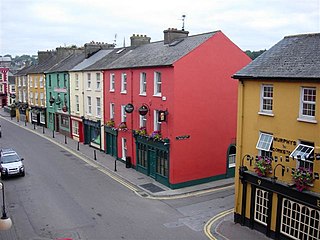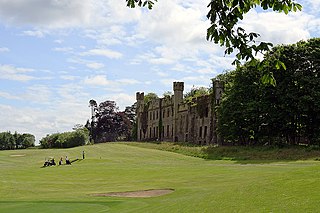
Bandon is a town in County Cork, Ireland. It lies on the River Bandon between two hills. The name in Irish means 'Bridge of the Bandon', a reference to the origin of the town as a crossing point on the river. In 2004 Bandon celebrated its quatercentenary. The town, sometimes called the Gateway to West Cork, had a population of 8,196 at the 2022 census. Bandon is in the Cork South-West constituency, which has three seats.

Earl of Bandon was a title in the Peerage of Ireland. It was created in 1800 for Francis Bernard, 1st Viscount Bandon. He had already been created Baron Bandon, of Bandon Bridge in the County of Cork, in 1793, Viscount Bandon, of Bandon Bridge in the County of Cork, in 1795, and was made Viscount Bernard at the same time as he was granted the earldom. These titles were also in the Peerage of Ireland. The titles descended from father to son until the death of his great-grandson, James, the fourth Earl, in 1924. The late Earl was succeeded by his first cousin twice removed, Percy Bernard, the fifth Earl. The latter was the great-grandson of the Right Reverend Charles Bernard, Bishop of Tuam, younger son of the second Earl. The fifth Earl was an Air Chief Marshal in the Royal Air Force. He had two daughters but no sons and on his death in 1979 the titles became extinct.

The Dean of St Patrick's Cathedral is the senior cleric of the Protestant St Patrick's Cathedral, Dublin, elected by the chapter of the cathedral. The office was created in 1219 or 1220, by one of several charters granted to the cathedral by Archbishop Henry de Loundres between 1218 and 1220.
Bandon was a parliamentary constituency representing the town of Bandon in County Cork, Ireland from 1801 to 1885. It elected one Member of Parliament (MP) to the House of Commons of the United Kingdom of Great Britain and Ireland.

Thomas Hales was an Irish Republican Army (IRA) volunteer and politician from West Cork.
Charles Brodrick was a reforming Irish clergyman and Archbishop of Cashel in the Church of Ireland.

Michael Andrew James Burrows is a bishop in the Church of Ireland. He was elected Bishop of the Diocese of Tuam, Limerick and Killaloe on 14 January 2022, having previously served as Bishop of Cashel, Ferns and Ossory.
Thomas Lincoln Joseph Mullins was an American-born Irish Fianna Fáil politician.
George Aglionby (c.1603–1643) was an English Royalist churchman, nominated in 1643 as Dean of Canterbury. He was a member of the Great Tew intellectual circle around Lucius Cary, and a friend and correspondent of Thomas Hobbes.
Richard Boyle was an English bishop who became Archbishop of Tuam in the Church of Ireland. He was the second son of Michael Boyle, merchant in London, and his wife Jane, daughter and co-heiress of William Peacock. His younger brother was Michael Boyle, bishop of Waterford.

Richard Lionel Clarke is a retired Irish Anglican bishop and author. From 2012 to 2020, he served as the Archbishop of Armagh and Primate of All Ireland: as such, he was the senior cleric of the Church of Ireland.
Jemmett Browne was the Church of Ireland Bishop of Killaloe from 1743 to 1745, Bishop of Dromore for three months in the middle of 1745, Bishop of Cork and Ross from 1745 to 1772, Bishop of Elphin from 1772 to 1775, and finally Archbishop of Tuam from 1775 until his death in 1782.
Thomas Wight, 1640–1724, was a native of Bandon, County Cork, Ireland, and author of the first History of the Quakers in Ireland. His father was Rice Wight, Church of Ireland minister of Bandon and a son of Thomas Wight, A.M. also a minister and a native of Guildford, Surrey.
John Popham was an English politician who sat in the House of Commons from 1628 to 1629.
Thomas Wight was a publisher and draper.
John Worth, B.D. (1648-1688) was an Irish Anglican Dean.
Richard Wight was an Anglican priest in Ireland in the 18th century.
Richard Lapp was Archdeacon of Cork from 1688 until 1690.
Henry Bathurst (1623–1676) was an English-born judge in seventeenth-century Ireland, and a member of a prominent Royalist family. He was Attorney General for the province of Munster and Recorder of Cork and Kinsale. As a judge he had a reputation, whether deserved or otherwise, for exceptional severity towards Quakers.

Kinalmeaky is a barony in County Cork, Ireland.






